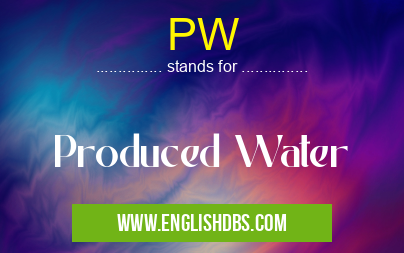What does PW mean in MANUFACTURING
PW is an acronym that stands for Produced Water. In the oil and gas industry, produced water is a term used to refer to the wastewater generated from wells in the process of oil extraction. This waste stream consists of a mixture of hydrocarbons, salts, heavy metals, and other residual compounds that can be potentially harmful if not managed properly. Produced water is typically stored in tanks or underground reservoirs before being transported off-site for proper disposal.

PW meaning in Manufacturing in Miscellaneous
PW mostly used in an acronym Manufacturing in Category Miscellaneous that means Produced Water
Shorthand: PW,
Full Form: Produced Water
For more information of "Produced Water", see the section below.
What is PW
Produced water is defined as any liquid byproduct that result from the oil exploration and production process. The composition of produced water can vary significantly depending on where it was obtained and how it was handled during the drilling process. Generally speaking, produced water contains a mix of brines, minerals, crude oils, greases, additives, and other organic compounds which may have been injected into the well along with drilling fluids like mud or foam. As such, this wastewater can contain high levels of pollutants that require careful management to ensure they do not end up contaminating local soils and groundwater supplies.
Benefits Of PW
Produced water has long been viewed as a nuisance by-product or waste stream in the oil and gas industry; however, there are many potential benefits associated with its reuse and recycling. For instance, produced waters contain valuable minerals and hydrocarbons which can be recovered through processes such as desalination or membrane filtration. In addition to yielding clean fresh water which can be used in aquaculture or agriculture applications, this practice also reduces strain on existing freshwater resources while helping energy companies reduce their operating costs. Furthermore, treating produced waters for reuse can help reduce anthropogenic releases of pollutants into surrounding ecosystems as well as decrease dependence on costly treatment systems aimed at removing contaminants from wastewater streams prior to discharge back into the environment.
Essential Questions and Answers on Produced Water in "MISCELLANEOUS»MANUFACTURING"
What is produced water?
Produced water is a byproduct of the oil and gas industry that consists of water, salt, and various other solids and chemicals that are brought up during drilling operations. This water can be reused, injected back into the ground or treated before being discharged into the environment.
What are some of the environmental risks associated with produced water?
Produced water can contain a variety of pollutants which can pose an environmental risk if not managed properly. Chemical compounds in produced water like hydrocarbons, heavy metals and other naturally occurring elements may be toxic to living organisms or hazardous when concentrated in large volumes. Additionally, it has high salinity levels which could decrease soil productivity or affect aquatic ecosystems near discharge points when not adequately managed.
How is produced water treated before it is discharged into the environment?
The treatment necessary for produced water will depend on its end use, such as agricultural reuse or disposal into waterways. Common treatment techniques include physical separation to remove solids from liquids, chemical oxidation processes which break down certain compounds and then biodegradation to degrade organic contaminants further. Depending on the specific contaminants present in produced water, additional technologies might be used to reduce concentrations to meet regulatory requirements.
What are some potential uses for produced water?
Produced water often contains a variety of minerals which makes it suitable for agricultural irrigation in certain cases. In other areas where there is an abundant supply of freshwater, seawater desalination or brine concentration technologies can provide higher quality sources of irrigation water than what produced water alone can offer. In addition to agriculture uses, oil companies have begun using their own recycled wastewater for drilling operations as part of their sustainability efforts while mineral extraction industries also use this resource to treat mining waste products for reuse and disposal.
How does recycling produced water help conserve resources?
By reusing produced water instead of withdrawing additional freshwater from rivers or aquifers, we ensure that there is enough freshwater remaining for human consumption as well as other industrial processes that require high-quality supplies of uncontaminated liquid resources. Recycling wastewater also reduces our reliance on energy intensive desalination methods and reduces the need for underground injection wells responsible for triggering seismic events.
What type of producers create most of the wastewater?
Oil and natural gas production account for more than 90% worldwide wastewater generation due to their widespread application across multiple countries around the world. Other activities related to mineral extraction may create significant amounts locally depending upon particular geographical locations.
Are there specific regulations governing how much wastewater a producer can discharge?
Yes - national regulatory authorities may set limits on total dissolved solid (TDS) levels in order to protect aquatic ecosystems in affected areas so producers must ensure their wastewater meets these requirements before any discharge takes place.
Final Words:
In summary, PW stands for Produced Water which is a byproduct generated from wells in the process of oil extraction containing hydrocarbons, salts, heavy metals, and other residual compounds with potential environmental harms if not managed properly. Although traditionally viewed as waste stream in the oil & gas industry there are many potential benefits associated with its reuse including potential clean freshwater application while reducing strain on existing freshwater resources & reducing anthropogenic pollutant releases into ecosystems when treated for reuse.
PW also stands for: |
|
| All stands for PW |
